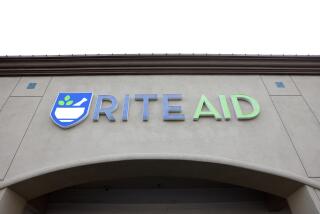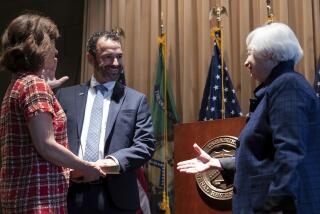S&L; Bailout Agency’s CEO Scales Back Funding Needs : Thrifts: This year’s cleanups will cost far less than estimated, a sign that the worst of the crisis may be over.
- Share via
WASHINGTON — Albert V. Casey, the new chief executive of the Resolution Trust Corp., said Wednesday that $25 billion will cover the costs of cleaning up the thrift industry through September, far less than the $80 billion sought earlier by the Bush Administration.
Despite the reduced estimate of the RTC’s funding needs, Casey said he wanted Congress to approve the other $55 billion to assure that the agency would be able to cover any cleanup expenses “through eternity.”
“I realize that this is not a popular vote,” Casey told the Senate Banking Committee at his confirmation hearing. If not for the RTC, which makes good on the federal guarantee of deposits up to $100,000, “insured depositors at failed thrifts would not get all their money, and what monies they did get would take years to recover,” he said.
A skeptical Congress last year approved $25 billion in funding for the RTC to close financially crippled S&Ls; and pay off the depositors until April 1. Under questioning from Democratic committee members, Casey said he will use just $10 billion by the deadline. If Congress provides new spending authority, he said, it would take until the end of the fiscal year on Sept. 30 to spend $15 billion more. Casey’s statements reinforced the Democrats’ skepticism about voting further funding for the agency.
“The RTC needs to make a very careful calculation of what it needs over what period of time,” said Sen. Paul Sarbanes (D-Md.). “It does not seem a very sensitive way to proceed to seek another $55 billion when the $25 billion would carry you until October.”
Committee Chairman Donald Riegle (D-Mich.) was clearly miffed when Casey told him that the RTC wouldn’t have an audited financial report for 1991 available when it comes to Congress to ask for an extension of spending authority beyond April 1.
“We need to have the books wrapped up,” Riegle said. “We need to know what happened in 1991 before we ask for more money and more time.” He added that it would be difficult to win congressional approval for new funding.
Casey said he could offer his internal records for the committee, but said the General Accounting Office, the investigative arm of Congress, would not complete its audit of the RTC before April.
Other RTC officials told the committee that the agency will try new methods to dispose of its vast $160-billion inventory of securities, mortgages and real estate. The agency will be selling securities backed by mortgages on some of the best commercial office buildings acquired from failed thrifts, RTC Deputy Director Lamar Kelly said.
The RTC now is selling $1.5 billion to $2 billion a month worth of securities backed by mortgages on homes, Kelly said. The RTC hopes eventually to have a similar sales volume of securities linked to top-flight commercial properties, a relatively new field, he said.
Casey promised the committee a rapid and thorough investigation of a scandal at the Denver office, which allegedly lost track of $7 billion in assets from failed thrifts. If improper behavior is uncovered, “I shall take quick and decisive action to correct the situation,” Casey said. “You have my pledge on that.”
He also denied that there were any political motives behind the RTC suit against Arizona Gov. J. Fife Symington and other directors of the failed Southwest Savings & Loan of Phoenix. The RTC has accused Symington and 11 other former directors of failing in their duties by approving risky and speculative investments by the thrift.
More to Read
Get the L.A. Times Politics newsletter
Deeply reported insights into legislation, politics and policy from Sacramento, Washington and beyond. In your inbox three times per week.
You may occasionally receive promotional content from the Los Angeles Times.










